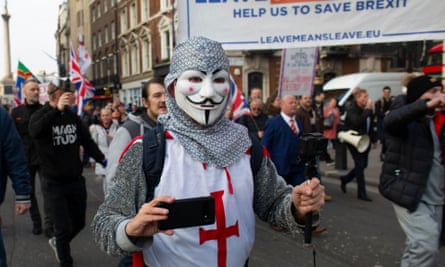December’s general election can resolve some of the great and most immediate challenges facing our country – our relations with Europe, the fate of austerity and the future of the NHS – and for that we urgently need a Labour government.
But something else, something fundamental to the character of our country, now tests us at a more profound level. For it will take far more than an election to heal our country’s deepening divisions and to eliminate the poison that is increasingly contaminating our public discourse and politics. Increasingly, we are becoming a United Kingdom in name only.
According to a Hope not Hate poll, 77% of British people now think Brexit is feeding prejudice and making our country more divided than ever – suggesting we are more at odds with each other than we were at the time of the poll tax, Iraq and even 1974’s three-day week. And as worrying, 67% of black, Asian and minority-ethnic voters now feel strongly that racism is on the rise, only 7% disagree and 56% say they have experienced some form of harassment in the past year. A staggering 70% of 18- to 24-year-olds report racist intimidation on social media.
But our country’s bitter and worsening divisions extend beyond this hostile environment and beyond the current battle between pro- and anti-Brexiteers. The country is now also more sharply divided between north and south, rich and poor, and between the four nations that until recently formed a cohesive UK. And already, after only a few days of campaigning, we have seen a further descent from civility into rancour.
More parliamentary candidates than ever have had to be withdrawn, exposed for their racism, sexism or homophobia. More social media activists than ever – most of whom would never dream of shouting abuse at people when face to face – are exploiting the internet to abuse and shame people whom they do not know and will never meet, in what Barack Obama has described as a judgmental “cancel culture” that simply blanks opponents out.
And while it is a great advance that in 2019 we have more women candidates than in any previous election, sadly a disproportionately large number of female MPs have given up on politics in the face of vitriolic trolling, intimidation and savage threats of violence and even murder.
The debasement of our public discourse has been aggravated by the systematic and sustained spraying of untruths, often by foreign state actors – and not in the expectation that their lies will be believed. Success for them is everyone starting to doubt that anything is true: and 44% of remain voters and 51% of leave voters now consider politicians and the media to be habitual liars. We do yet know the full scale of the foreign penetration into our social media and politics, not least because the parliamentary intelligence committee report on Russian interference in the 2016 referendum has deliberately been withheld. But clearly, more than ever before, our politics is being infected and enmities inflamed by dark money and dirty tricks.
Central to the new politics of division and hate across the UK is the displacement of an outward looking patriotism by narrow, adversarial nationalisms which need – and invent – enemies, and make it almost impossible to unite the country around any common purpose or shared direction.
With the SNP now threatening the hardest of “hard” separations and the Conservatives whipping up English nationalism with their claim that under a Labour government Scotland would run England, the great British virtues – tolerance, civic responsibility, reciprocity between nations and pragmatic internationalism – are being consigned to history by a new breed of nationalists not interested in ending divisions but in exploiting them.

There is a serious risk that, far from healing the country’s wounds, the final three weeks of the election campaign may tear us even further apart. Boris Johnson is hardening up an already hard Brexit. By making the no-deal exit that was narrowly avoided in October the most likely outcome of his trade agreement deadline of December 2020, he reminds us that the Conservatives threaten an ever-more-intolerant, inward-looking and isolationist Britain, as well as a deregulated and even more unequal society.
In the next few days our political leaders will publish their election manifestos and, as they finalise their commitments, it is not too late for serious parties to rise to the challenge of reuniting our riven and discontented country. The basic building blocks should be self-evident: radical measures to end the economic insecurity that is the breeding ground for populism; no truck with divisive nationalisms or with intolerance and racism from whatever quarter it comes; new laws and measures to counter antisemitism and Islamophobia; a genuine outreach to the public, from citizens assemblies to a constitutional convention, bringing all the nations of the UK into a project to overhaul our ailing political institutions.
Put simply, Britain needs a promise of inclusive and principled decision-making – and the rejection of sectarian government geared solely to partisan advantage. In this way we can re-empower the values of empathy and solidarity, and the aspirations to cooperate and to share that, until recently, made us the most successful multinational state in history.

